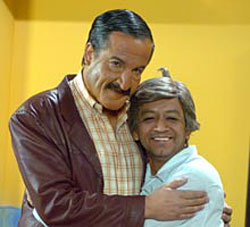 |
 |
 |
 News Around the Republic of Mexico | September 2005 News Around the Republic of Mexico | September 2005  
A Nation Hungry for TV Satire
 Wire services Wire services


| | Politicians wanting more publicity are begging actors to portray them on a popular spoof program. |
Every Monday evening, millions of Mexicans sit down to guffaw at something new to television here: a half-hour comedy show that figuratively eviscerates their president, the first lady and the nation's top politicians.

"El Privilegio de Mandar" "The Privilege of Power" is so popular that some ambitious politicians figure some exposure is better than none. They are contacting the show's producers begging to be spoofed.

Those powerful enough to already rate mockery are clamoring for meetings with the actors who play them, hoping that they can discreetly influence scripts that satirize them as power hungry, materialistic or just plain dim.

‘Unprecedented Time’

"This is an unprecedented time for television in Mexico, a time when democracy has opened up much more," said "Privilege" producer Reynaldo López in an interview at the Televisa network.

"We just had a call from a politician who asked to come talk to us. We told him no, which is our policy," López said with a chuckle.

The show's five writers refuse to meet with politicians. But they tell the actors to feel free to accept invitations from politicians and just explain to them that they don't write the scripts.

López estimates that as many as 20 million Mexicans sometimes tune in to "Privilege," a huge number given that Mexico's population is a little over 100 million.

Since the program debuted earlier this year, independent ratings rank it far and away the top show for Monday's 10 p.m. prime time slot.

The show's success is attributed to Mexico's more open political climate. Five years ago, the country voted out the oneparty regime of the Institutional Revolutionary Party, the PRI, which ruled for 71 years.

Under the PRI, censorship on TV was common and news programs always favored the PRI during elections.

In the late 1990s, Mexico's Azteca network began airing a short segment featuring puppets acting out scripts that lampooned politicians.

But "Privilege" breaks new ground, with skits with real people that rival some of the most scalding portrayals of President Bush on "Saturday Night Live."

President Vicente Fox's character is often unsophisticated or clueless about Mexico's problems.

The actress who plays Fox's wife, Marta, is calculating and relentlessly materialistic, a play on reports of the expensive designer dresses she relishes.

Aspiring political candidates eyeing the July 2006 presidential election are adding their own surreal touch to the show.

Because they want to reach a huge audience, those who would be president are buying advertising time during "Privilege" to air slickly produced, serious campaign commercials.

It is possible to watch an actor portraying a politician as a buffoon during a sketch and then suddenly see the real politician somberly peering out from the TV during an ad, imploring Mexicans to vote for him.

Expensive Airtime

Commercials during the time period are expensive by Mexico standards, an average of US35,000 for 20 seconds, according to TV critic Florence Toussaint, who writes for Proceso magazine.

López and his writers say they are careful to spoof all political parties and favor no one.

"There seems to be equal time to satirize all, and that's what makes the show popular," Toussaint observed. "If that should change, it might lose its audience."

Alfonso Villalpando, the actor who portrays Fox, said he undergoes a two-hour makeup transformation, including latex mask, to play the tall, deep-voiced president.

When Villalpando accompanied another actor to a meeting with a cabinet secretary in April, he told the secretary he would like to meet Fox in the flesh.

About a week later, Villalpando was invited to have coffee with Fox at his residence.

The two talked alone for 40 minutes about democracy, freedom of speech and how the president was no longer untouchable, Villalpando said.

"He told me he sees the show every Monday night," Villalpando said. "He did say he doesn't like the depiction of Marta in the show, but he never said to change it."

Two weeks after meeting the president, Villalpando was invited to provide entertainment at a university class reunion with Fox and his old classmates, one of whom is a Televisa manager. The actor went in full makeup as Fox and read a satirical speech the show's writers had prepared for him.

López wonders if Televisa will continue airing the show through the July 2006 election.

He and the writers hope so, and intend to continue the policy of lampooning all parties and candidates equally. Political ads will continue to air as long as the show captures such a wide audience.

After the campaign officially begins, Mexico's political parties will all have millions of dollars in public financing at their disposal to spend on TV ads and other forms of campaigning.

Still, "there could be pressure to end the program before the July election," López said. "It's going to be a big test for Televisa and the commitment to freedom of expression." | 
 | |
 |



